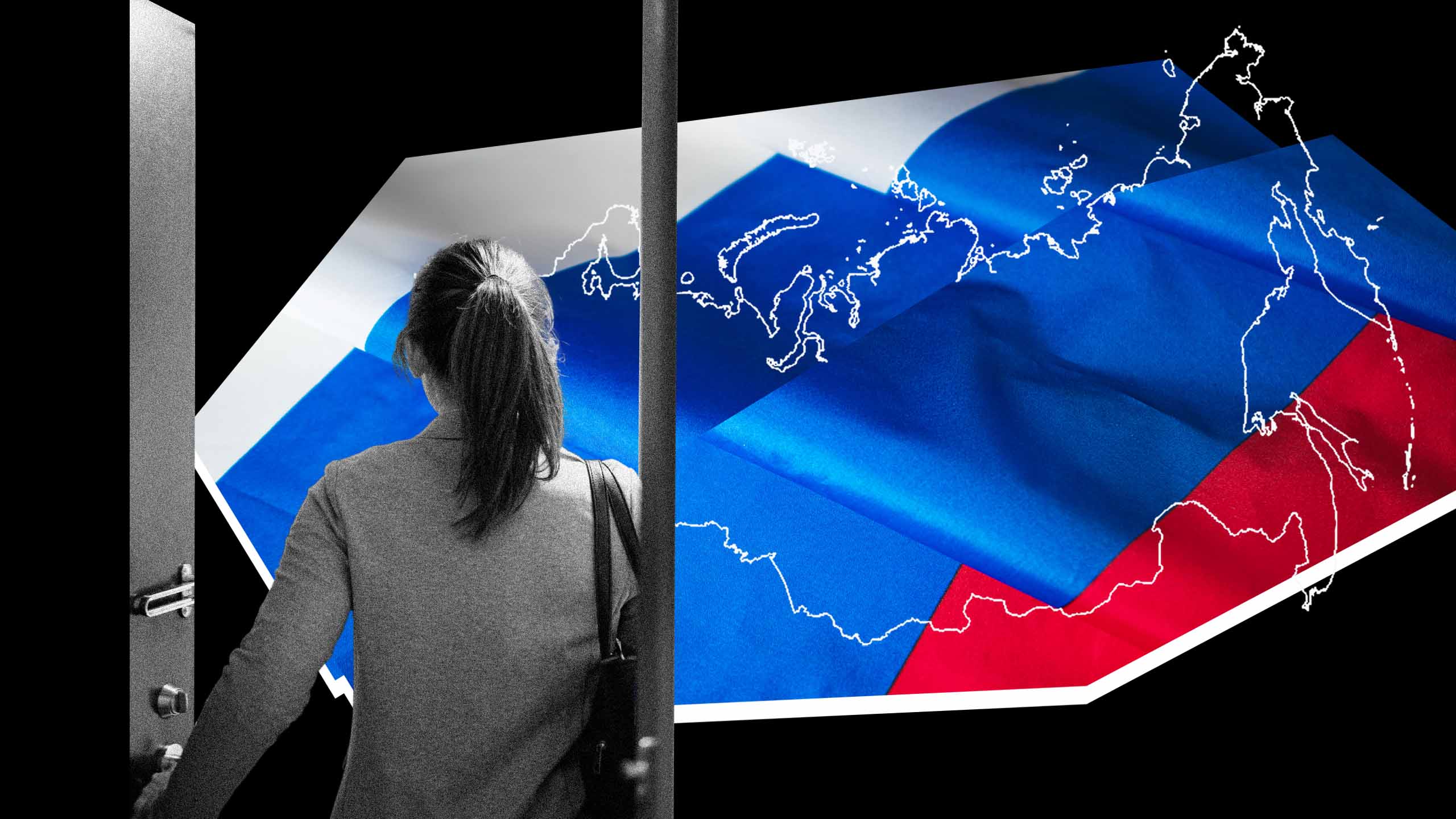Ada Blakewell hoped to be one of the last trans activists left working in Russia. The 23-year-old ran a shelter in Moscow, providing safe haven for LGBTQ+ Russians at risk. Now, she herself waits in a safe house outside of Russia’s borders. Blakewell left Russia in late December.
“It was not my decision to leave Russia; I wanted to stay even longer,” says Blakewell. She fled after being accused of committing fraud, a claim that she denies. She says that the charges are instead linked to her political work. “There are fewer and fewer trans activists in Russia now. I wanted to be one of the last. But you can’t change fate.”
The start of the Kremlin’s full-scale invasion of Ukraine in February 2022 ushered in a new era of LGBTQ+ oppression in Russia. As Moscow’s vision of a sweeping victory over Kyiv disintegrated, President Vladimir Putin renewed tried-and-tested rallying cries for “traditional values” to shore up public opinion.
This rhetoric was quickly backed up by new legislation. A law passed in July 2023 outlawed gender-affirming surgery and forbade Russians from changing gender markers on official documents. Later, in November 2023, a court named the “global LGBTQ+ movement” in Russia an “extremist organization,” essentially putting queer activism on par with terrorist groups.
The ruling was made in a four-hour, closed-door hearing, with Russia’s Ministry of Justice releasing no information to the public to support its case. Under Russian law, anyone found to be part of an “extremist organization” faces a potential jail term, but these unknown elements mean that no one knows how the designation will be enforced. Activists, however, believe that the deliberately vague definition of the “global LGBTQ+ movement” will essentially allow authorities to prosecute queer people at will.
Each new development has painted a bleak image of the future for Russia’s LGBTQ+ community. Now, with Moscow preparing to hold presidential elections next month—a vote that Putin is all but guaranteed to win—more queer Russians than ever before are left facing an impossible decision: should they stay and fight for Russia’s future, or leave for safety abroad?
Resistance and resilience
For queer activists such as Blakewell, staying in Russia has been a way to continue their vital work. Throughout 2023, Blakewell worked to raise funds, helping trans people to change their documented gender markers before Moscow’s ban came into force. She also rallied against conversion therapy, a practice that she herself survived.
But remaining in Russia was also its own form of resistance. While LGBTQ+ oppression has steadily worsened in Russia over the past decade, queer people have continued to build their own safe spaces—bars, clubs, parties or film clubs—particularly in more liberal cities, such as Moscow and St. Petersburg. They have allowed LGBTQ+ Russians to find sheer, unexpected joy in their own communities.
“For some people, surviving conversion therapy makes them angry or bitter,” Blakewell says. “I was just so happy to have my freedom, so happy that I could show that freedom to other queer people in Russia. You can have joy. You can have your community. In cities like Moscow, a lot of cisgender people wouldn’t understand the concept of being trans, but they would still support us and give us the spaces we needed.”
Experts, however, now warn that Russia’s latest anti-LGBTQ+ crackdown marks a pronounced change in how the regime operates. When the Kremlin originally launched its ban on “gay propaganda” in 2013, the law stressed that it was “protecting children” to ensure that it remained palatable to voters, says Sergey Katsuba, a PhD candidate at the Sutherland School of Law at University College Dublin. His research focuses on institutionalized discrimination as an authoritarian practice.
But that law has since become a far wider ban, ushering in a new era of rule by force.
With its new anti-LGBTQ+ legislation, “Russia doesn’t need to pretend that it’s protecting children. It doesn’t need to try and use democratic means in order to justify itself. It has just banned everything; it’s just censorship now,” he says. “It signals a dictatorship that previously ruled through deception is now ruling through violence.”
Even if the new legislation remains relatively unenforced, its mere existence has deadly consequences. Katsuba’s research found that even 2013’s emblematic legislation heralded a spike in anti-LGBTQ+ hate crimes: he documented 1,056 anti-LGBTQ+ hate crimes between 2010 and 2020, including 365 of which ended in fatalities. The real figure is likely to be much higher.
Moscow’s latest decrees merely seem set to greenlight further attacks, from both fellow citizens and the state, under a range of different pretexts. Less than 48 hours after the Russian Supreme Court declared the “global LGBTQ+ movement” to be extremist, police raided queer venues across Moscow, supposedly searching for drugs.
As even these small pockets of freedom are slowly eroded, LGBTQ+ Russians who were previously keen to stay are now taking stock. With their deliberately ambiguous wording, there are few limits on how Russia’s new legislation could be used, says Katsuba.
“It’s down to police officers to decide what ‘gay propaganda’ is,” he says. “Any member of the LGBTQ+ community can be accused of spreading gay propaganda. That creates fear and self-censorship, because ultimately the person being prosecuted is interchangeable. It’s a law that’s designed to shapeshift.”
Harsh realities
Not every Russian who wishes to emigrate is able to leave the country. Many are trapped by circumstances—particularly the LGBTQ+ community’s most vulnerable.
Founded in the wake of Moscow’s invasion of Ukraine, Queer Svit is a grassroots organization helping LGBTQ+ people and racialized people from Ukraine, Russia and other Eastern European and Central Asian countries who have been affected by war or repression. Since Russia’s latest anti-LGBTQ+ rulings came into force, they’ve seen a steep rise in queer people asking for help to leave the country.
“Usually, we get about 20 requests asking for advice on leaving Russia each month,” says Queer Svit co-founder Anna-Maria Tesfaye. She herself made the decision to leave Russia in 2019 and lives in London with her wife. “Following the ruling against the LGBTQ+ movement as an ‘extremist organization,’ we were getting 50, 100.”
On occasion, Queer Svit can use its limited funds to help at-risk Russians leave the country quickly. Tesfaye and her team have the difficult task of prioritizing those most in need: queer people in the public eye, or those being actively targeted and harassed by law enforcement, their employers or their families, are considered high risk.
But in most cases, queer Russians will need time to pre-plan their escape, says Tesfaye. Emigration requires careful preparation—not because it is difficult to leave Russia itself, but because a host of practical difficulties lie in wait on the other side.
“People stay and keep their heads down and just hope that nothing too bad will happen to them. You get used to the oppression, whether you want to or not.”
Queer Russians who wish to reach Europe or North America will often need to navigate a complicated and expensive visa process. Even those who reach the neighbouring countries of Armenia, Georgia or Kazakhstan—where Russians can stay without a visa—need to be able to find support themselves financially. And while some queer Russians apply for asylum, the mental toll that the process can take is often devastating. In February 2023, a 21-year-old trans woman from Russia, Khina Zakharova, took her own life while waiting in a Dutch refugee camp. Months later, in November 2023, another Russian LGBTQ+ asylum seeker, Mikhail, also died by suicide.
For some, these barriers are simply insurmountable, says Tesfaye. She estimates that 15 to 20 percent of people who approach the non-profit for advice on how to leave ultimately change their mind.
“Sometimes, we detail the visa process and other barriers, and people think: ‘I will not be able to handle this,’” she says. “People might have a job, they might have family, they might have friends. Even if they hate their job, or they have abusive, queerphobic parents, they have a paycheque for food and a roof over their heads.”
In the end, many queer Russians simply choose to face the dangers they know, rather than risk potentially unknown perils elsewhere. “I have queer friends in Russia who are in danger,” says Tesfaye. “It’s easy to judge, but it is hard to make these decisions. People stay and keep their heads down and just hope that nothing too bad will happen to them. You get used to the oppression, whether you want to or not.”
Painful divides
Ultimately, Tesfaye stresses that each queer Russian must choose their own path. But the issue of emigration remains emotionally fraught, she says. Some who leave Russia label those who stay as weak, naive or accuse them of propping up the Putin regime. Others who remain are angry at emigrants for abandoning their community and their country, where the anti-war opposition still struggles to fight back.
“The resentment between people who have left and people who have stayed breaks my heart,” Tesfaye says.
Blakewell admits to struggling with complex feelings toward Russians whom she believes chose to leave the country. “I had friends who publicly said they would not leave Russia, or that they would stay until the very last moment. And then they left, without even the threat of prosecution,” she says. “I felt it was a total betrayal.”
These new rifts are painful, and are unlikely to be resolved while LGBTQ+ Russians cannot live or travel freely. For now, many remain set on rebuilding the communities they have lost, both inside and outside the country. Blakewell hopes that she will soon move to western Europe. In the meantime, she is reaching out to other vulnerable Russians, or sharing her experience with other local activists.
“We have a long way to go until we will create a stable place for trans people to live safely,” she says. “But while I’m here, I just want to make an impact on the place where I’m living: to leave it better than when I arrived.”


 Why you can trust Xtra
Why you can trust Xtra


